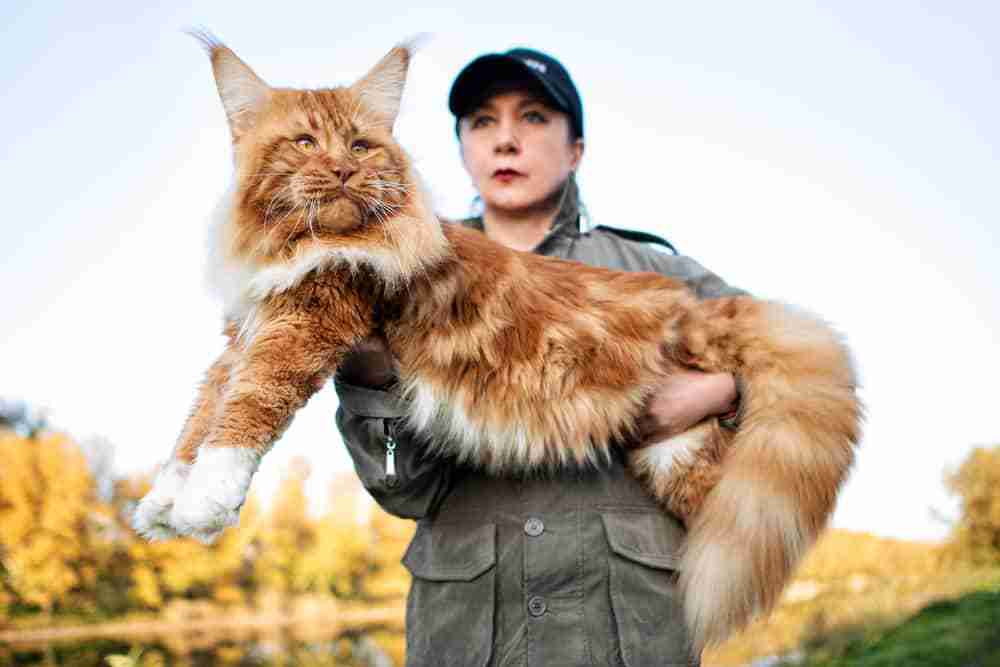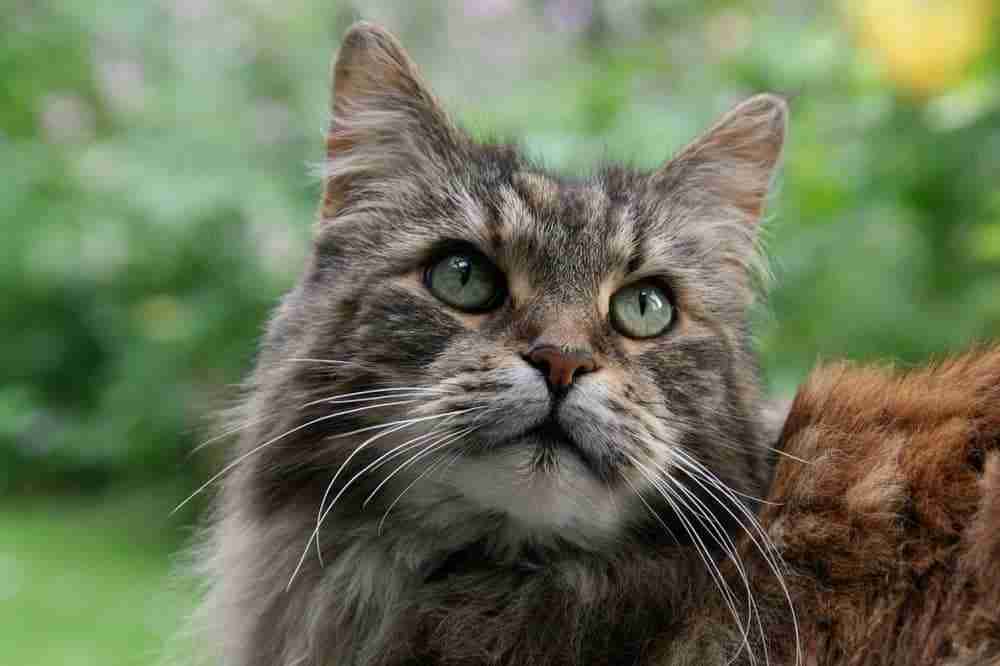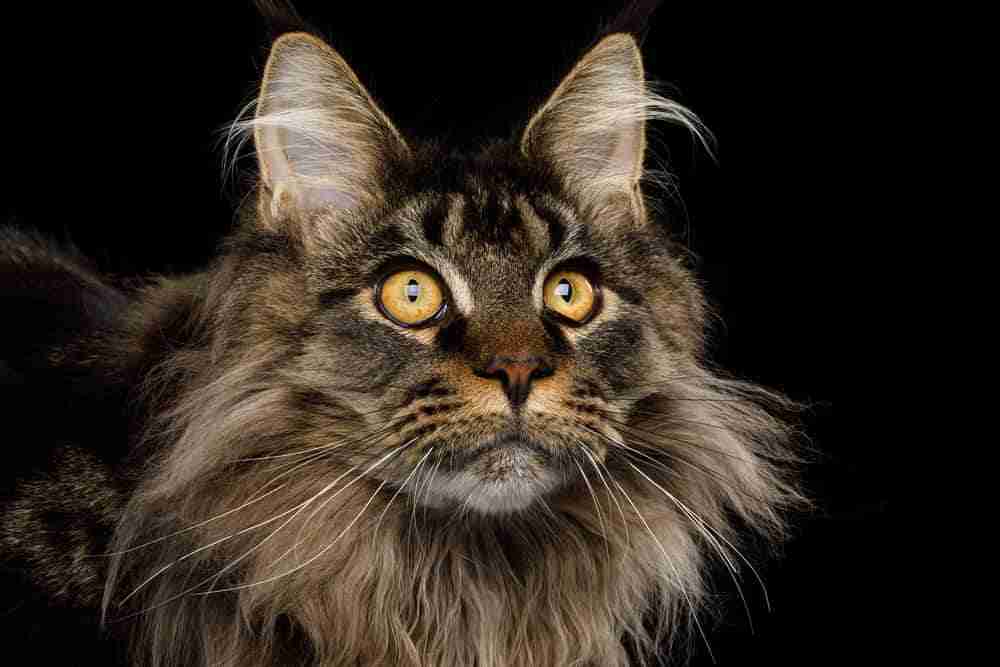The Maine Coon is the largest housecat and is well-known for its thick, furry coat that helps them through the coldest winters in New England.
It’s the long hair that gives them a reputation as a hardy breed, giving them a totally different appearance to other cats.
The fur might be an issue for some prospective Maine Coon Cat owners. The constant shedding means the hair gets all around the house, even with regular brushing.
With all that fur flying around, you’re probably wondering if it’s going to trigger your allergies.
Are Maine Coons hypoallergenic? No, they are not!
Maine Coons might not be hypoallergenic. However, they’re an ideal breed for people suffering from animal allergies.
People with cat allergies are allergic to the Fel d 1 protein found in cat saliva, urine, and dander – not the fur itself.
Regularly grooming your Maine Coon ensures that you don’t come into contact with enough of the protein to trigger an allergic reaction.

What Are The Signs Of An Allergic Reaction To Maine Coon Cats?
Anyone that’s ever been on the receiving end of an allergic reaction knows what it feels like as it approaches. However, you might be a first-time pet owner and have no idea if your allergic to cats.
An allergic reaction is an immune response to harmless substances like pollen or other allergens in the environment. People with overly-sensitive immune systems are the most likely candidates to receive an allergic reaction when they encounter these allergens.
When the body comes across an allergen, it produces an antibody known as “Immunoglobulin E” (IgE). The purpose of IgE is to fend off a viral attack on the body. However, as the body increases Immunoglobulin E levels, it starts to present symptoms relating to allergies.
Affected individuals notice that their nose starts to run, their sinus clogs, and inflammation begins to appear in the face as it turns red.
In severe allergic reactions, the affected individual might also experience fluid building in the lungs, and tightness in the throat, making it challenging to breathe and creating huge stress.
It’s rare, but some people might experience “anaphylaxis shock,” where the airways close and the person loses consciousness. If the affected individual doesn’t receive immediate medical treatment, they may perish.

What Is The Cause Of Cat Allergies?
Most people make the mistake of thinking that their cat’s fur is the cause of their allergies. In reality, cat hair has nothing to do with initiating an allergic response.
The protein Fel d 1 is responsible for causing an allergic reaction to cats. You can find this protein in the following three cat excretions.
- Dander (cat skin secretions)
- Saliva
- Urine
It’s impossible to prevent the spread of these excretions over the cat’s body. Cats like to lick and groom themselves, and they spread the protein over their fur and around your home.
The allergens are light and sticky, and they can get on your couch, bed, or anywhere the cat sits. If a visitor picks up your cat, they come in contact with its dander, and they’ll experience an allergic reaction to the proteins.
It’s also possible for the allergens to hang in the air while you’re brushing the cat. If you breathe them into your lungs, it causes an allergic reaction in people with allergies to the Fel d 1 protein.
What Are The Symptoms Of Cat Allergies?
If you have no idea what to expect from an allergy attack, here is a list of common symptoms people experience.
- Sneezing and a runny nose
- Rash appearing on the face and or chest
- Itchy, red eyes
- The appearance of the skin condition known as hives
- Red skin around scratches or bites
- Wheezing and coughing
- A blocked or stuffy sinus
The speed of the onset of the allergic reaction differs from person to person. Those people with severe allergies might notice the onset of symptoms immediately upon entering a room with cats.
Some individuals with lighter sensitivity might be fine for four to eight hours after exposure to the Fel d 1 protein.
Symptoms can persist for minutes or hours, depending on the person’s sensitivity. If you have allergic asthma, you’re a high risk for an allergy to the Fel d 1 protein produced by cats.
People with this condition are at higher risk of an allergic response, and between 20% to 30% of these individuals are at risk of experiencing a severe allergic reaction.
Are Maine Coon Cats Hypoallergenic?
So, is it possible for people to be allergic to Maine Coon cats – the simple answer is yes. There is no such thing as a hypoallergenic cat – all of them produce the Fel d 1 protein. If you’re allergic to it, then you’ll eventually receive an allergic response.

However, it’s important to note that Maine Coons are less of a risk to pet owners than other cat breeds in terms of creating an allergic response. The thick fur of the Maine Coon means it spreads less dander around your home.
With regular grooming, a Maine Coon should produce less Fel d 1 protein than other cat breeds. As a result, there’s less of a chance of your experiencing an allergic reaction around a Maine Coon.
Female Maine Coons produce less of the Fel d 1 protein than the males. Therefore, this characteristic makes them ideal for pet owners who want as close to a hypoallergenic cat as possible.
The Maine Coon’s long fur also makes it challenging for the cat to spread the dander around, making them less of an allergy risk than other breeds.
It’s also important to note that people with light cat allergies can build up a tolerance to the Fel d 1 protein over five to ten years, reducing their allergic response to cats.

Are There Hypoallergenic Cat Breeds?
As mentioned earlier, there is no such thing as a hypoallergenic cat. All cats produce the Fel d 1 protein to some degree. The protein comes from the cat’s sebaceous glands and saliva, and it spreads across the cat as they groom themselves.
Up to 10% of the human population is possibly allergic to cats. Some people are more sensitive to the Fel d 1 protein than others, and some cat breeds secrete more of the substance than others.
Therefore, we could say that some cats have a more “hypoallergenic” quality than others. Here is a list of cat breeds that secrete low amounts of the Fel d 1 protein.
- Maine Coon
- Bengal
- Sphynx
- Devon Rex
- Oriental
- Russian Blue
- Siberian
- Balinese
- Cornish Rex
- Siamese
In Closing
So, are there any hypoallergenic Maine Coon cats? The answer is, unfortunately, no. However, it’s one of the better breeds for people with cat allergies. Maine Coons secrete low amounts of the Fel d 1 protein, and their thick fur stops them from spreading it around the house.
If you’re looking to buy or adopt a kitten or cat, the Maine Coon is an good breed for reducing potential allergic reactions to the animal.
Reducing your exposure to the Fel d 1 protein is a sensible strategy if you think you might have mild allergies. Remember to frequently brush your Maine Coon and vacuum your furniture often to reduce the chances of experiencing an allergic reaction to your cat.
